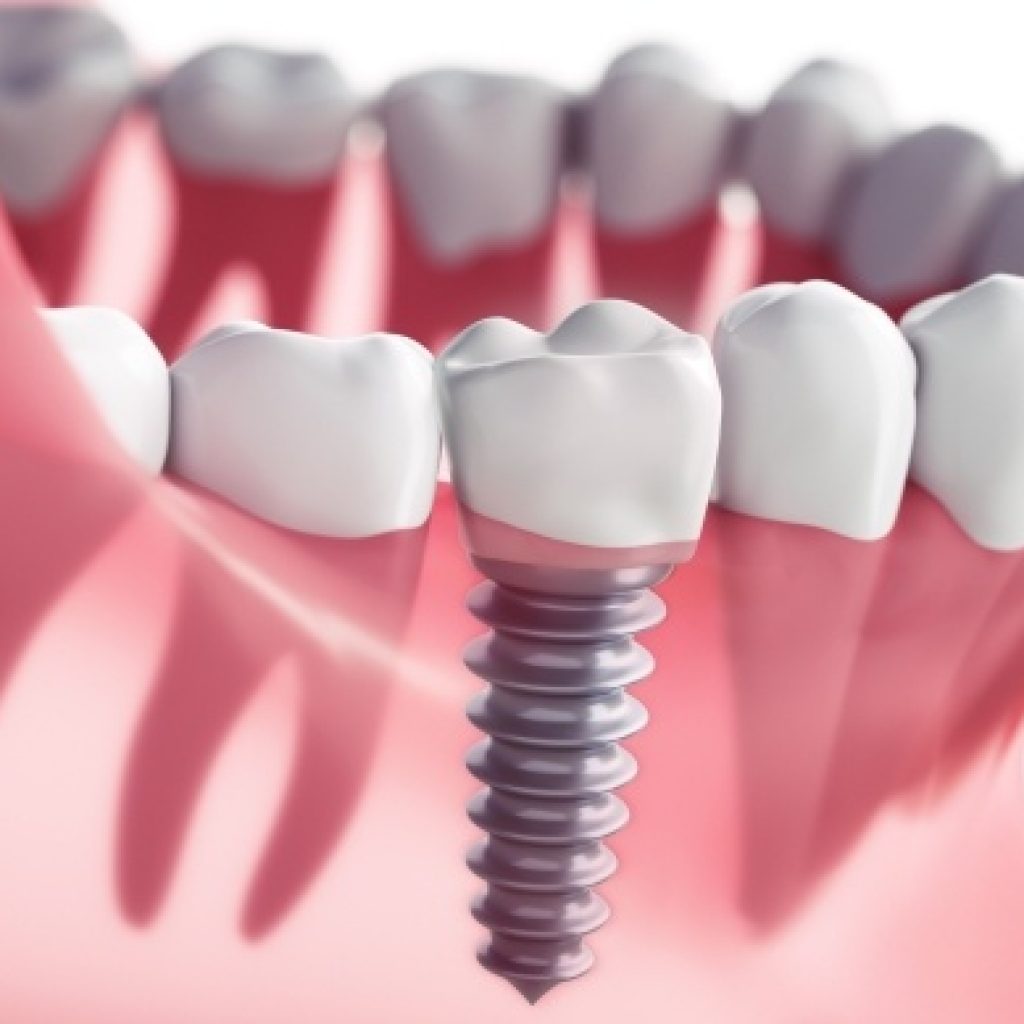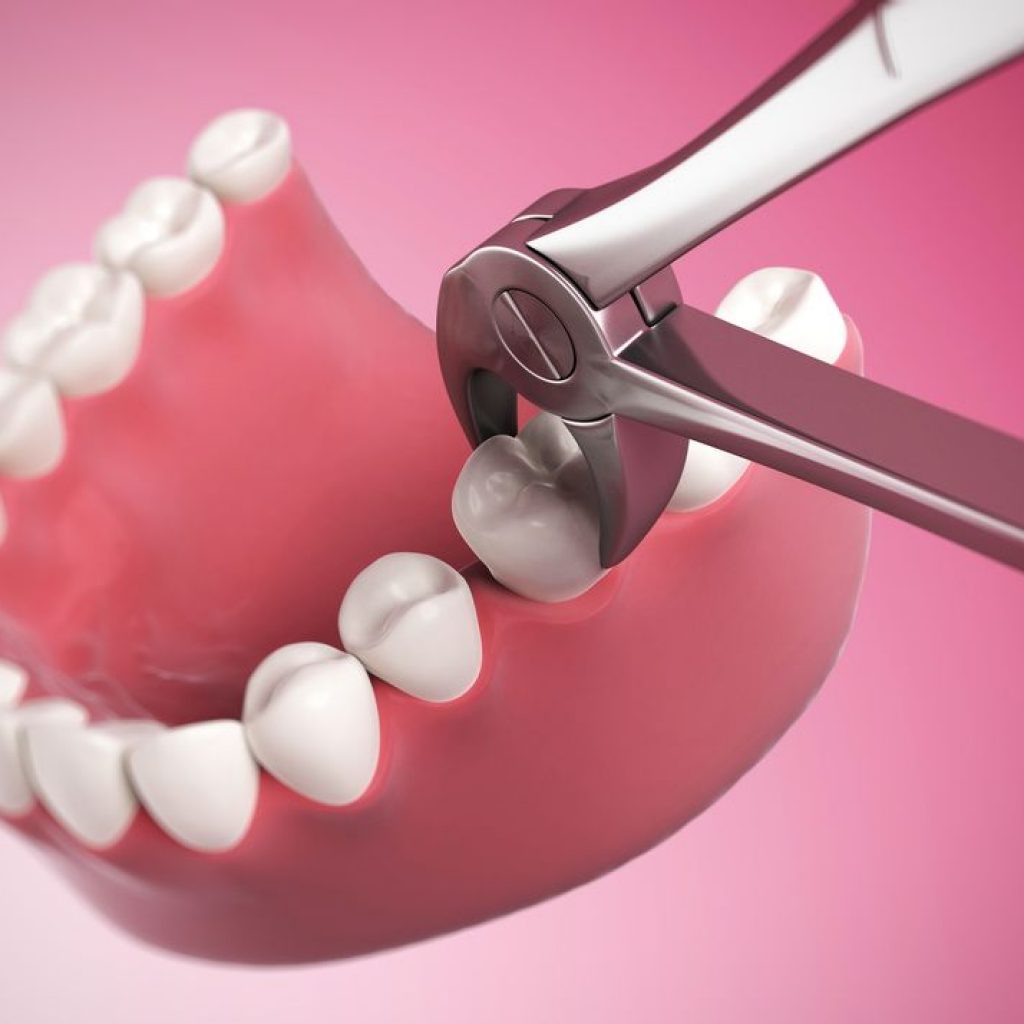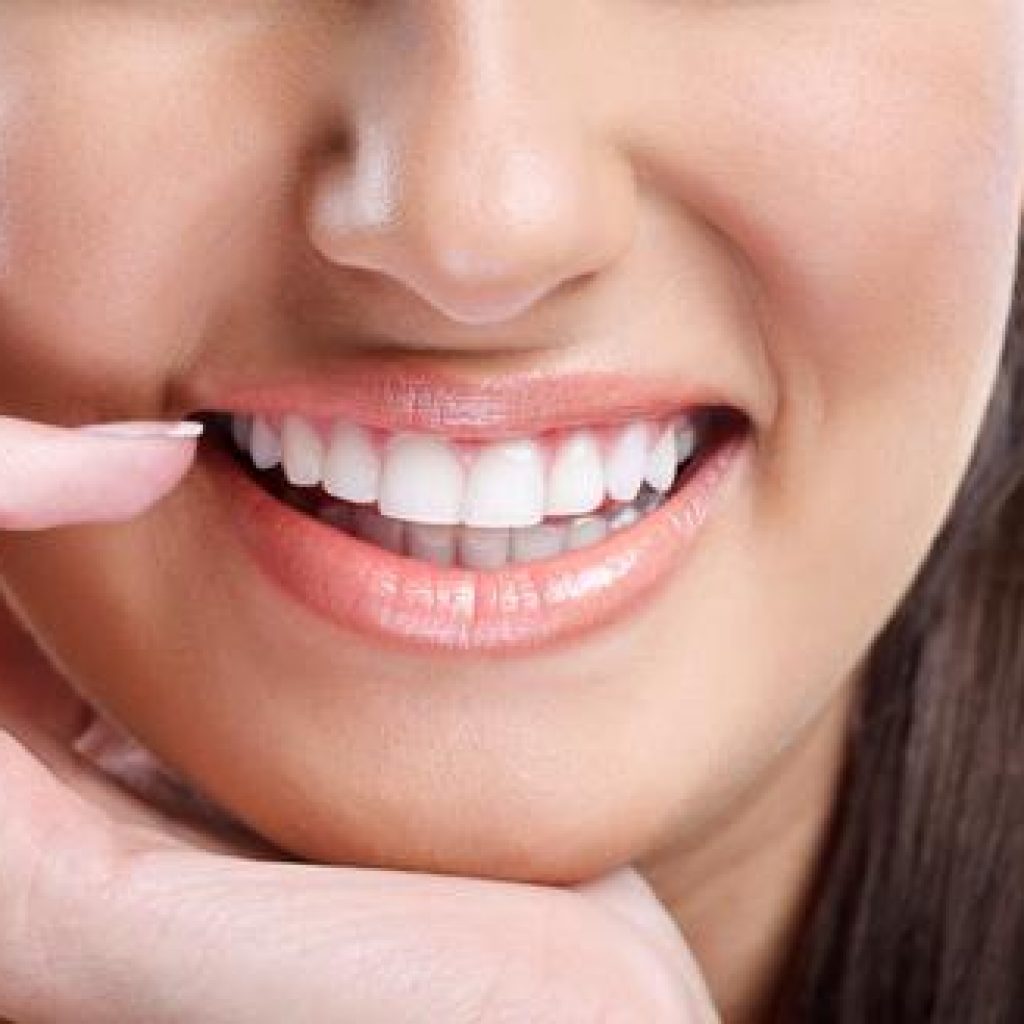
Cosmetic veneers are truly the most multi-faceted way to mask a horde of dental imperfections. They are an excellent quick fix for teeth that have inherent stains that cannot be bleached away. Cosmetic veneers are the perfect solution for chips and cracks as well. For patients who do not want to go through the process of orthodontics, cosmetic veneers can straighten your smile painlessly in just a few sessions.
There is no debating why dentists and patients alike are raving fans of veneers. Now that the cat is out of the bag every dental procedure has its pros and cons. A patient who would like to try cosmetic veneers needs to examine what they are and how they work.
The concept of dental veneers is sort of like a clip on nails but for teeth. They are permanent . They do look like real teeth. They are narrow at the base where the teeth meet the gums, and wider toward the biting end of your teeth. Most veneers can be custom tailored to match the color, shape, and contour of the patient’s teeth.
All restorative dental procedures should compliment and match the rest of your teeth. Veneers are really no different. Veneers are extremely thin which allows them to rest on your teeth without increasing their volume. Veneers are usually made of synthetic composite like materials such as resin or even porcelain. The reason for resin or porcelain is that they mimic the same shades of your natural teeth. Veneers are durable as long as the patient doesn’t exhaust them due to strain or overuse. Any patient considering cosmetic veneers should review the following:
Benefits
- Affordable
- Last longer than dental crowns
- Don’t have to remove as much enamel as compared to crowns
- Straighter teeth
- Versatile and blend with other teeth
Disadvantages
- Irreversible
- Sensitivity to heat or cold
- For badly failing teeth with decay crowns are a better option
- Veneers are susceptible to chipping and cracking
- Veneers tend to have a shorter life span as compared to bridges or crowns
If you have questions about cosmetic veneers or cosmetic dentistry and would like to set up a consultation feel free to contact our office at (760) 734-4311. We look forward to having the opportunity to help you achieve your the goals you have set for your new smile makeover 🙂
A dental implant is the most prominent procedure to replace a missing tooth. Your tooth in most cases has eroded due to decay, deterioration, or damage sustained to the area. On a more positive note, our team and staff have a solution! Dental implants are merely a post that is surgically implanted into the patient’s jawbone to act as the missing tooth’s roots. The dentist will then have a false tooth placed over the implant to serve as the tooth’s visible portion.
There are a myriad of options when it comes to choosing the right dental implant restoration and material type. If a patient needs only one tooth replaced, it is possible to pick a dental crown over a dental implant. However, if the adjacent teeth are rotted, a bridge over dental implants is better suited for the patients long term results. Patients might choose from porcelain or zirconia as far as materials go. Each is durable and looks natural, and can be used in any portion of the mouth. The dentist here at San Marcos Dental Center will pick the right color to match the rest of the teeth.
What is the process of having a dental implant surgery?
The patient will need to have two surgeries done to place the implants. During the initial consultation appointment, our team will take some x-rays and images to custom tailor a treatment plan. If the patient has some bone loss, they might not immediately be the right candidate for the procedure. Instead, some bone grafting might be necessary to build up the jawbone. Once the grafting has been completed, then the patient can have the dental implant procedure. Anesthesia is given before the surgery. The patient will generally have an incision made in the gumline, creating a hole in that jawbone. The dentist can place the implant through that hole, stitching the gums closed when they are finished.
The dental implants will then fuse to the bone throughout around three to six months. Then the patient is ready to take the next step. This Involves making an incision into the gums again, exposing the implant. Then the dentist will add the abutment to the implant. This connects the dental implant to the crown for a custom fit. The dentist will then stitch your gums closed after that but does it so the abutment is exposed. The abutment helps the restoration and implant connect. However, the patient will need to heal for around two or three weeks first. Finally, your dentist can place the repair over the teeth. This piece is customized to fit the patient’s teeth better. That way, it will not interfere with the bite or feel uncomfortable. Over time, the new tooth will start to feel completely natural, completing the patient’s smile.
Our team is easily accessible and more than happy to answer any questions that you may have. Please feel free to stop by any time and say hello to our friendly staff. We realize that dentistry can be very intimidating but our team is committed to making sure that your dental procedures are as quick and painless as possible. We are always happy to hear feedback from patients and potential patients, and our dentists are filled with professional dental expertise so you are always in good hands!
A dental extraction is a favored dental procedure. Dental extractions are usually a desperate remedy when all other options or treatments have failed. Our primary goal here at San Marcos Dental Center is to protect your dental structure and keep your teeth healthy. Nevertheless, there are times when extracting teeth is unavoidable.
Under what circumstances should a patient have dental extraction?
- Wisdom teeth removal – Impacted wisdom teeth can cause a great deal of pain and affect your overall dental structure.
- Orthodontia – This process or treatment is to improve the alignment of your teeth. If your teeth are overcrowded, the dentist will extract teeth to make more space.
- Infection – Periodontal disease or tooth decay that affects your teeth and gums.
- Chipped or broken teeth – In some cases, dentists can save a tooth if there is enough blood supply, but if the blood vessels are damaged the teeth have to be extracted
Are dental extractions painful and is it a long procedure?
On your first visit, we will perform a full dental exam where our dentist will assess your dental health.
If your teeth are beyond repair you will be scheduled for a dental extraction. In most cases, the procedure is done on the same day, unless you have pre-existing medical conditions or clearance from your physician. The dentist will perform a simple extraction or surgical.
- Numbing of gums – The dentist will use a local anesthetic on your gums and jaw. In the case of surgical extraction, the dentist will use dental sedation. This helps to calm the patient and reduce discomfort.
- Dental extraction – The dentist will use forceps and dental elevators to remove your teeth
- Closing the socket – This is where your dentist will stitch the affected area to help with the healing process.
What is the post-operative dental care that is required?
- Taking all prescribed antibiotics
- Ice and compression
- Elevating your head
- Don’t brush and do not use straws to drink with.
Once your teeth have been removed the dentist may make a recommendation for cosmetic dentistry. Our main goal would be to replace any missing teeth that might be a threat to your dental structure. Several treatments are available such as dental implants and bridges.
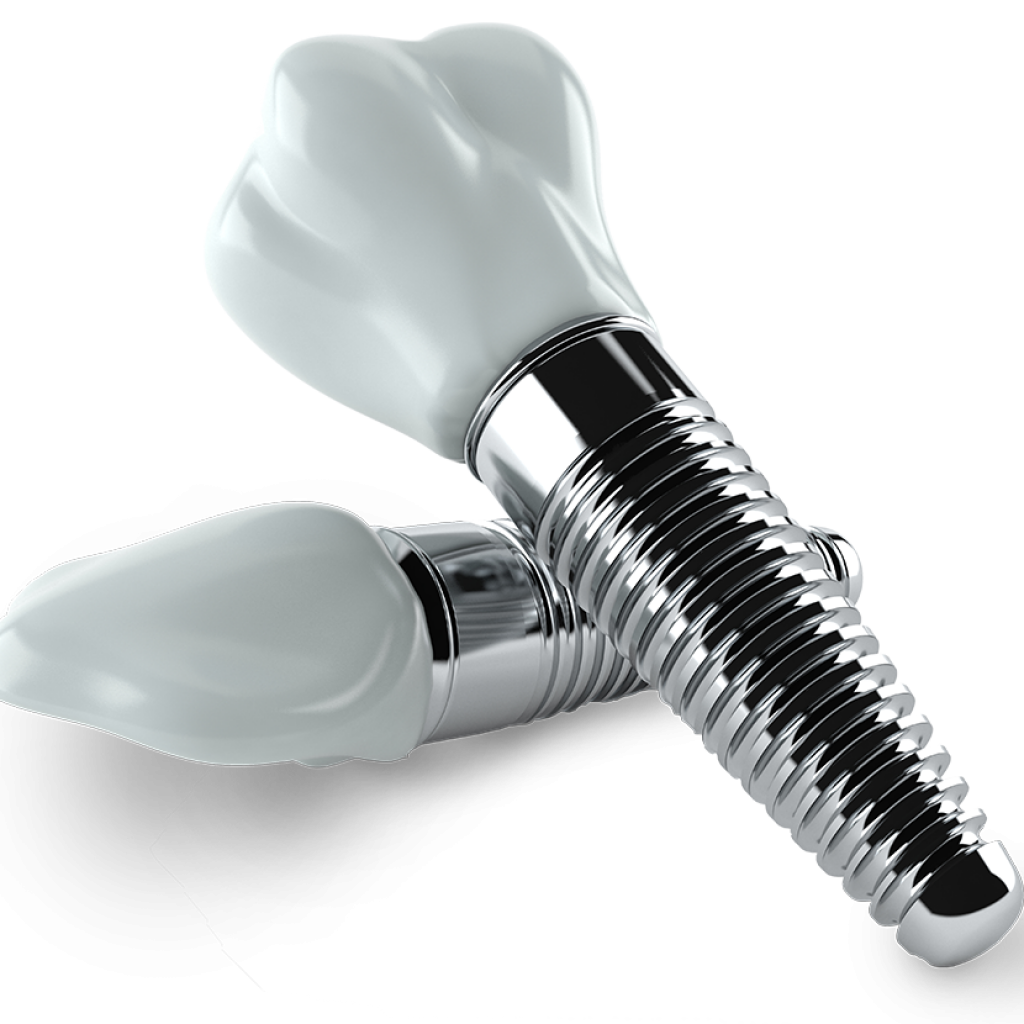
Dental implants are by far the most effective way for long-term tooth replacement. Dental implants operate and look like natural teeth, only requiring a traditional dental hygiene routine to maintain them. But what is the lifespan of dental implants? The answer to your question is twofold it boils down to how healthy your gums and teeth are and the implants you choose. The science and engineering behind dental implants have evolved in the two decades. The cases of implant failures due to functionality or the body rejecting are very rare. Abusing the implant, pre-existing medical conditions, and or disease are more likely causes when dental implants tend to fail.
How long do dental implants last?
With regular flossing and tooth brushing the actual implant itself can last a lifetime. This assumes that the patient is returning every 6 months for regular checkups. The crown however tends to only last anywhere from ten to fifteen years before it may need to be replaced due to normal wear and tear. The location of your dental implant also plays a factor, molars for instance are used most frequently during chewing. At the end of the day if they are used the most they will wear out faster than let’s say your incisors in the front.
What is the best option for tooth replacement?
Dental implants are a lifelong solution for missing teeth and are the preferred options of choice between patients and dentists alike. Dental implants entirely restore missing teeth with a natural-looking tooth that function and last longer than natural teeth. The bonding agents used to hold dentures in place nine times out of ten fails, which leads to slipping causing them to fall out. Dental implants are surgically attached to the interior portion of your jawbone. This prevents the dental implant from putting strain on neighbor teeth like dental bridges tend to do and do not require any special cleaning.
What causes dental implants to malfunction or fail?
Dental implants produce a long-term restoration and replacement solution for damaged or missing teeth when maintained and cared for. But there are some scenarios or conditions that can cause the implant to fail. Pre-existing medical conditions such as cancer or diabetes have a higher risk for failure. As mentioned earlier dental implants must be maintained, poor oral hygiene can cause gum disease which can lead to a gloomy effect on the success of your implants.
Cosmetic veneers are a phenomenal way to rehabilitate your smile, especially if you are dealing with unpleasant stains, discoloration, or otherwise unattractive teeth. Cosmetic veneers are one of the swiftest and most efficient dental procedures to restore and preserve your smile. Our team here at San Marcos Dental Center will do a thorough dental examination to uncover if you are indeed a good candidate for cosmetic veneers. At the end of the day cosmetic veneers is the swiftest and most efficient dental procedure to restore your smile to its former glory.
The veneers themselves act as a shell or casing to cover your teeth to mask any defects. The shells are simply bonded to your teeth using dental cement. Cosmetic veneers in most cases are composed of composite resins, ceramics and porcelain.
Before attaching the veneer to the tooth itself, our dentists will have to remove a small piece of your enamel. This process is needed to accommodate enough space for your new veneers. Once the bonding agents have been set your veneers will function just like your original teeth. A key benefit with veneers is there isn’t a cleaning procedure. You can manage and maintain your veneers with the same daily cleaning regiment.
Why should I choose cosmetic veneers?
Veneers can cover a wide range of dental issues such as hiding stains, discolorations, spaces or gaps, and badly shaped teeth. After the veneers are installed you will immediately reap the reward of a new perfect set of teeth. Since veneers are made with composites, or porcelain they are engineered to last and will not stain as easily over time. You will need to take proper care of them just like your normal set of teeth, since there are other health complications such as gum disease or tooth decay that can affect your veneers.
Are you interested in cosmetic veneers? Please call us today to schedule a consultation with cosmetic veneers so you can have that new smile with just a few visits!
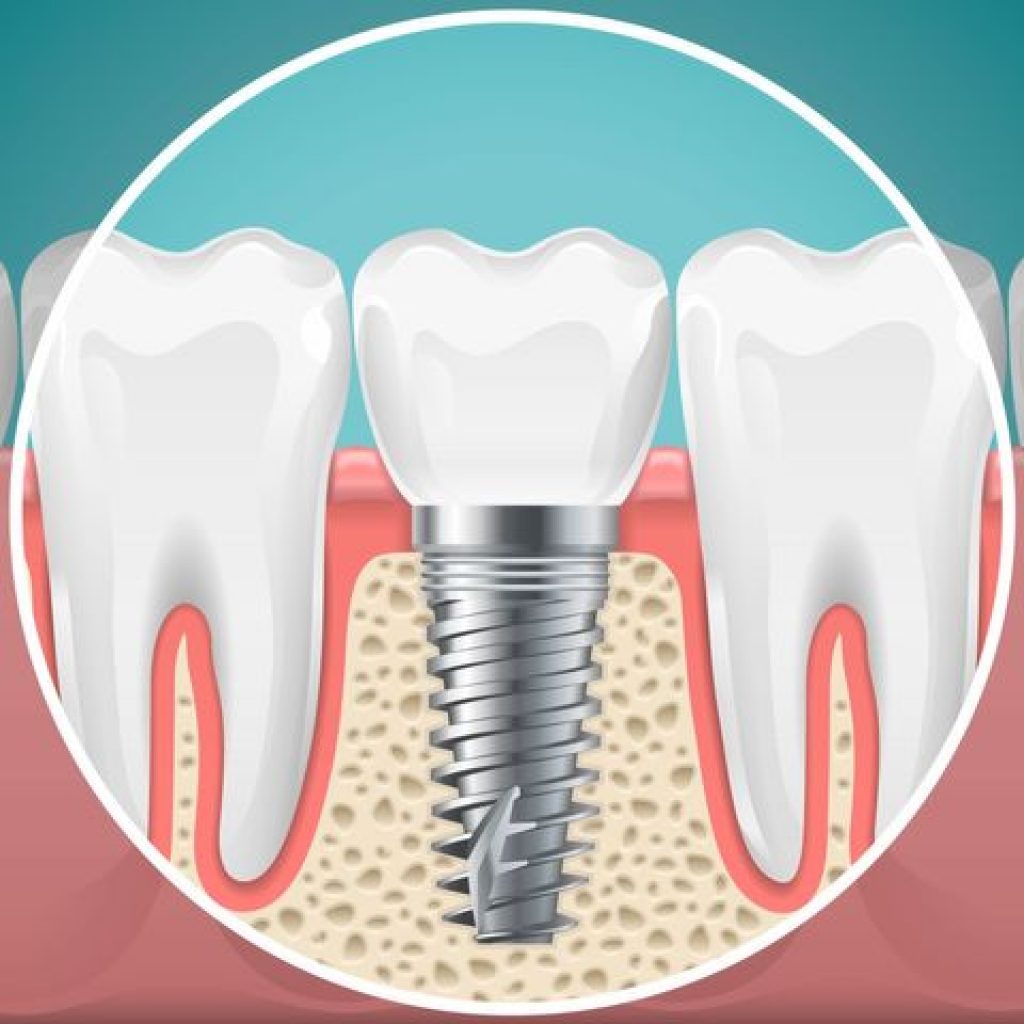
Dental implants are an amazing chance for any patient to restore their teeth to their former splendor. Aesthetic and functional dental implants are a great way to enhance your smile.
A dental implant’s main purpose is to replace missing or damaged teeth. Dental implants are tailored custom for each patient to work cohesively with your existing teeth. These are five truths about dental implants that most patients may not know:
Tooth loss is more common than you think
“According to epidemiological studies, it is estimated that 178 million Americans are missing at least one tooth and about 40 million Americans are missing all of their teeth. As we age, the problem gets worse as 30 percent of adults between 65-74 years old have no natural teeth.”
Dental Hardware are engineered stronger than roots
A lot of patients when coming to visit our office think that crowns and implants are the same. Unfortunately, it’s inaccurate. Dental implants are shaped like hardware screws and surgically implanted into the jawbone. The bone surrounding the implant must before any restorative work can be complete.
Dental implants surgeries are low-risk
Reports on dental surgeries and statistics show a success rate as high as 95% in most cases.
Old age, poor bone health, are accredited to a higher risk for surgery failure. Dental implant surgery is considered very low risk and instances of minor complications are far and few between. Patients of course will experience the normal discomfort of pain directly at the implant site, along with facial swelling and mild bruising. Gum bleeding and sensitivity may occur after surgery
Bone grafting might be needed
Even though it sounds like a serious procedure, bone grafting is a normal part of the routine of improving the overall success rate. Bone grafts create a better foundation and base for your implants. The most common scenario used in surgeries is artificial bone. Once your jaw has healed you will be ready to proceed with your implant surgery.
Postoperative aftercare is simple
Taking care of your teeth and mouth after surgery is relatively easy. The main objective is to keep the area clean to reduce the chances of infections. Saltwater rinses are a simple way to disinfect your mouth. Recommended to repeat several times a day and most importantly after meals. Following a strict diet of only soft foods is helpful after your surgery. Avoiding hot food also and taking over-the-counter pain medication will help ease the pain.
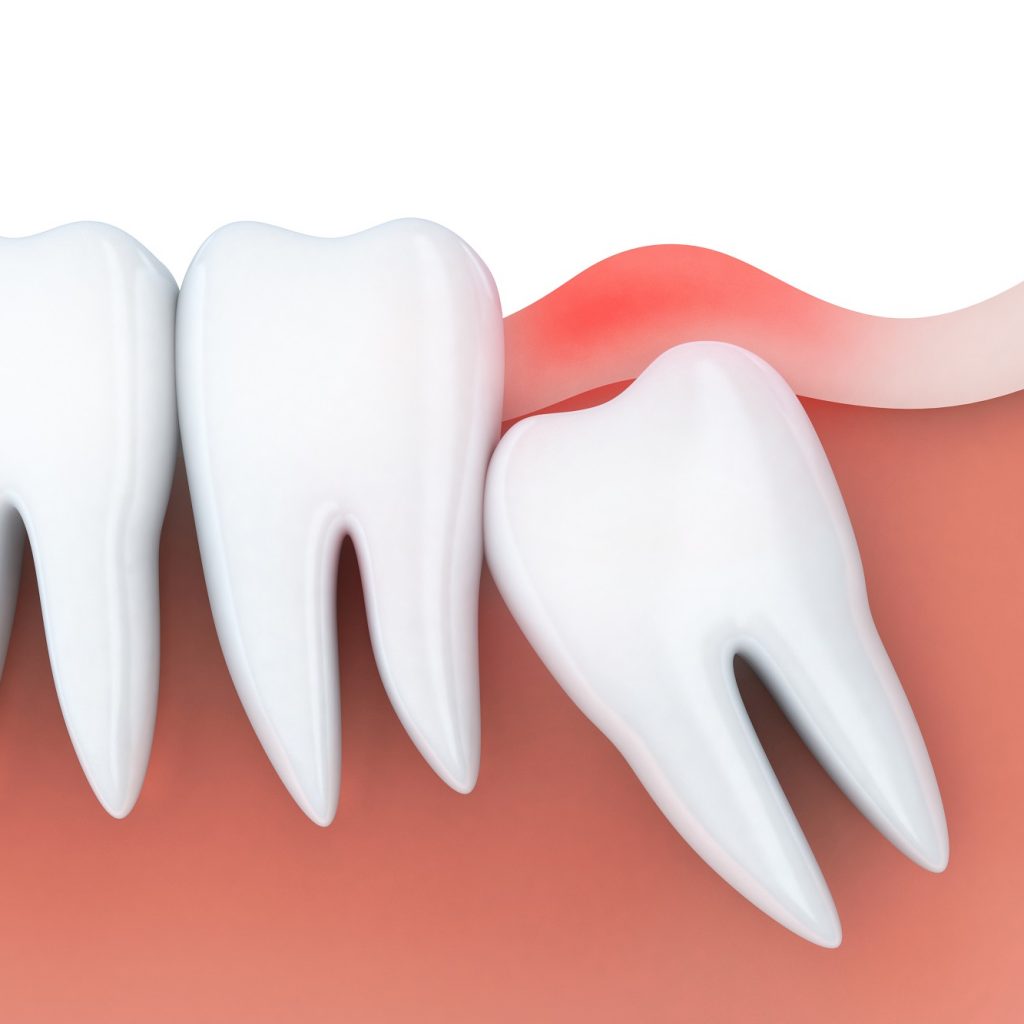
If your general dentist mentions it’s time to remove your wisdom teeth. In most cases, they may have to refer to an oral surgeon who will perform the procedure in their office. The recovery process is usually three days you will be back on your feet feeling normal again.
Why should my wisdom teeth be removed?
Wisdom teeth are a third set of molars located in the back of your mouth. Wisdom teeth usually grow from the ages of 17-25 and can be visible on X-rays. Most patients have the removed for one of the following reasons:
- They are impacted – Do to the location of your wisdom teeth being in the recesses of your mouth, they usually will not grow in normal or straight. In some instances they grow into your jawbone or gums causing an immense amount of irritation and or pain.
- Come in at an angle – This may lead to them press up against other teeth.
- Not enough room – Your jaw has no more room for the extra set of molars.
- Cavities or gum disease – A Lot of times you will not be able to reach the wisdom teeth with a toothbrush or floss.
Preparation:
You will meet with your dentist or oral surgeon to talk about the procedure, at this appointment make sure to:
- Talk about existing health issues
- Drinking, smoking or drug use
- Ask any questions that you might have about the surgery
- Anesthesia – options
- Allocate adequate time off from work or school to accommodate for ample rest and recovery. Setup child or pet care and a ride home if needed.
During Surgery:
Your surgery should take 45-minutes, you will receive one of these types of anesthesia to lessen any pain during your procedure. ‘
- Local – Your dentist will numb your mouth with a shot of local anesthetic such as novocaine or lidocaine, You may also be administered nitrous oxide to relax you prior to your surgery or to make you doze off. You will feel alert again shortly afterward.
- IV – The oral surgeon will numb your mouth and also give you drugs through a vein in your arm to make you feel drowsy. You might sleep through the entire process.
Your dentist may have to cut your gums or bone to remove your teeth. In this case they will also have to stitch the wounds to make sure they heal quickly. These stitches usually dissolve after a couple of days. They also may apply gauze pads in your mouth to stop the bleeding.
Post Surgery:
Everyone’s chemistry will react differently to the effects of anesthesia. If you have had local anaesthesia in some cases you will not be permitted to drive or go back to work or presume normal activities. Most people have no little or no pain immediately after surgery. Swelling and mild discomfort should only be expected for a few days afterwards. Your mouth may need a few weeks to completely heal.
Do’s:
- Ice Packs
- Soft foods
- Plenty of fluids
- Resume brushing after a couple days
- Take all medications for infection, pain and swelling
- Call dentist if swelling, discomfort, or pain doesn’t improve
Don’ts:
- No smoking
- Hard or crunchy food
- No gargling or swishing
- Do not drink through a straw
Have you ever had a nightmare or dream where you were missing some or all of your teeth? What would you do if you were ever to lose a tooth in real life? One of the best solutions would be to receive a dental implant. Dental implants are a dental procedure where a dentist or oral surgeon surgically places an artificial tooth that is integrated and fused in the jawbone. This is one of the best long-term options for teeth replacement and restoration.
Just a decade ago if you lost a tooth your only options for treatment of a lost tooth would be a fixed bridge or dentures. The problem with fixed bridges long term they primarily rely on the integrity of the adjacent healthy teeth to be the anchors. Inherently overtime these teeth can be compromised. Your last option to restore your teeth would be removable dentures. The thought of dentures to most would make you cringe. Dentures unfortunately are not a full-proof solution from time to time they slip, fall out, or make an irritating clicking sound when you speak.
Dental implants are made of titanium and are fused to your jawbone, serving as the foundation for your missing tooth. The major disadvantage with fixed bridges is they need to be replaced two or three times during a lifetime.
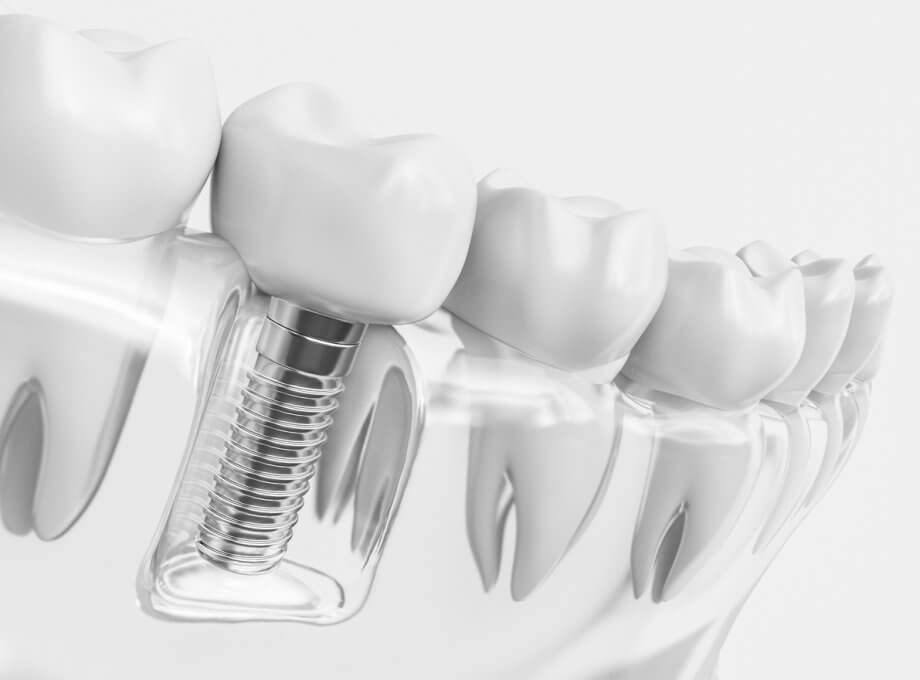
Benefits to Dental Implants
- Aesthetics – Dental implants are superior to bridges and dentures for a few reasons overall look, feel, and function.
- Preserve Healthy Teeth – Because dental implants do not use anchors or the teeth next to them they end up preserving the integrity of your smile 🙂
- Reliability – Unlike fixed bridges you won’t have to worry about replacing them a few times throughout your life, or misplacing them like dentures.
- Confidence – No slipping, clicking, or even worse saving you the embarrassment if they ever were to fall out!
What’s the process and what should I expect as a patient?
Dental implant surgery is not a quick fix. It’s a process that will involve:
- Full dental exam – X rays, cleanings, and dental molds
- Treatment plan – Dr. Hurt and the team will work closely with you to create a specific treatment plan. Before your surgery, we will comprehensively evaluate the number of healthy teeth. The number of teeth that need to be restored or replaced, along with the health of your gums and the condition of your jawbone. After the procedure, you will be instructed on how to care for your new dental implants.
- Procedure – Dental implants can involve several surgical procedures which can take anywhere from three to nine months. It is a long journey but most of the time will be allotted for the recovery process and allowing your new bone to graph or grow to your jaw. Once fully healed an abutment is placed followed by a crown or dental prosthesis.
- Pain control – During your treatment you will receive a form of anesthesia or sedative. You will also want to make sure to have a friend or family member pick you up from our office because you will be groggy.

Patients can enjoy quality dental care at SMDC without the pain typically involved with dental visits
Oral Conscious Sedation (OCS) meets that incredible need. The Dentists who have made a commitment to learn the advanced technical skills required to practice OCS provide a solution for those needing this service putting them into a state of “twilight sleep” without rendering them actually unconscious. To be totally successful a dentist must learn more than just the technical skills. The certified OCS dentist must understand the emotional state as well. This involves understanding the state of a high-fear patient. This requires the dentist to actively listen to those who have avoided dentistry for years because of intense, realistic, palm-sweating, sick-to-the-stomach, eye-popping, and sleep depriving fear.
It is a well-known fact that many people are often afraid to tell anyone about their fear, so they feel isolated. As dentists, we must be their “rock” in these situations and let them know that we understand their fear and that is okay for them to feel the way the do. Using compassion and our expertise we are able to take their fear seriously, they are not being silly, and we care about their emotional needs as well as their dental needs.
If the patient fears one dental visit to the dentist, imagine their frustration when they find out that they have not attended to their dental health over many years because of their fear, and that they may have to have numerous appointments, over many months, to complete their care. This is always received as discouraging news and often becomes the deciding factor in not having their dentistry done.
“Is there a way, with sedation, that our patients could have their treatment accomplished in minimal visits, with no pain and little memory of this experience?” “Would this be encouraging?”
As certified in OCS we can provide this kind of treatment in a comfortable and caring way which will improve your patient’s health and self-esteem while at the same time improving the individual’s view of your professional competency.
It is imperative that dentists adopt to what is known as two distinct, separate causes of oral cancer. Tobacco / alcohol use which is traditionally identified as a leading risk factor for the development of oral cancer and the infection of HPV-16 which is rising rapidly especially in the younger ages that are non-smokers between the ages of 25-50.
Oral cancer is on the rise in all age groups regardless of tobacco and alcohol decline due to the spread of the spread of a particular strain of human papilloma virus, HPV-16. In fact, “HPV may contribute to the development of approximately 20% to 30% of all oral cancer case” worldwide and 40 to 80% of all oral cancer case in the US.
Because there are two distinct causes for oral cancer, and therefore are two different important protocol for detecting them. For example, recent data tells us the HPV related oral cancer is more elusive than the tobacco / alcohol related cancer. Unlike tobacco and alcohol which occur mostly in the anterior floor of the mouth and the lateral borders of the tongue, HPV lesions are buried deep within the tissues, possibly below the basement membrane barrier at the base of the tongue, in the tonsillar area, and in the oropharynx.
For this reason HPV cannot be detected with traditional tools. Moreover, HPV can cause oral cancer with no signs until the disease is very advanced.
Most Americans will have some version of HPV in their lifetimes. The HPV virus infects at least 50% of all people who have had sex at some time in their lives. It is “likely that changes in sexual behaviors of young adults over the last few decades and which are continuing to spread HPV and the oncogenic versions of it.” This, while distressing, are not surprising because there are 130 strains of HPV viruses. Only a handful are oncogenic (correlated with cancer growth), and HPV-16 is the one that causes cervical cancer in women and oral cancer as well.
Of this HPV-16 most of us (99%) possess an immune system. Because HPV related oral cancer develop via transmission of HPV-16 over moist epithelial cells, sexual contact, including but not limited to open mouth kissing and genital-oral contact, is a risk factor for HPV-related oral cancer. Other risk factors are lichen planus and other auto-immune, inflammatory diseases of the mouth; periodontal disease: diets lower in fruits and vegetables; and genetic predispositions such as inherited defects in genes contributing to DNA repair.
In order to do a thorough oral cancer screening it’s imperative that your doctor do at least the following;
- Extra-oral visual and tactile examination, including but not limited to the palpation of the neck.
- Intra-oral visual and tactile examination.
- Use of screening tools.
- Asking patients appropriate and revealing questions and waited for their responses.
- Patient education, particularly provision of information on benefits of vaccinating against HPV
The following should be included in your dentists protocol:
- Can you tell me about any swelling or pain you’ve experienced in your face, mouth, neck, tonsils or throat?
- Any painless, non-moving firm bumps on your neck?
- Mouth sour lasting more than two weeks?
- Any oral bleeding?
- Changes in taste?
- Changes in voice sounds?
- Changes in the surface of your mouths?
- Problems with eating or swallowing?
- Recent changes in weight?
- Numbness or tingling in your face?
- Recent changes in vision?
An answer to any of these questions may indicate a viral infection with HPV, and needs a further investigation. “The HPV positive group is the fastest growing segment of the oral population.” One hundred people are diagnosed with oral cancer every day. Screening for oral cancer is all about saving lives. Telling your patients how much you care about them by telling them about HPV-oral cancer.
Call The San Marcos Dental Center at 760 734-4311 and make an appointment today!


